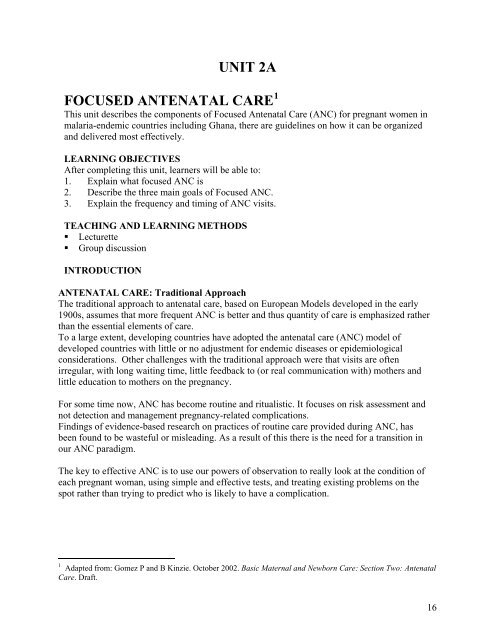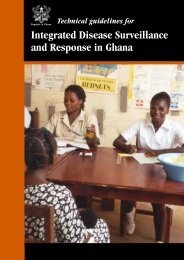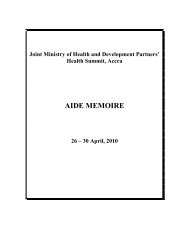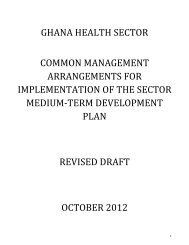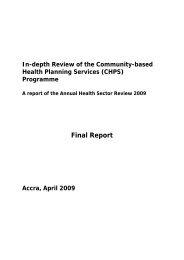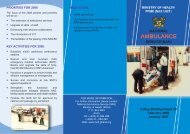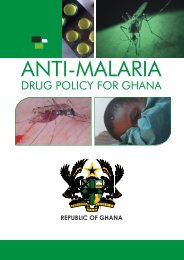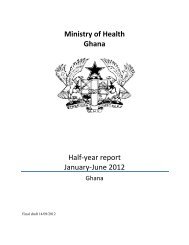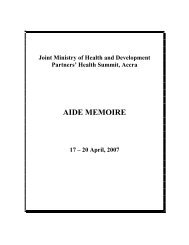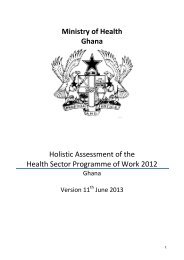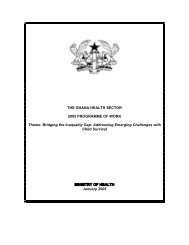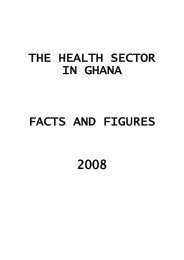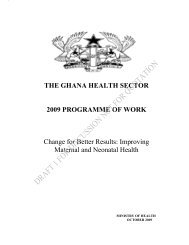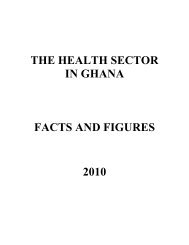Training Manual for Preventive Malaria - Ministry of Health
Training Manual for Preventive Malaria - Ministry of Health
Training Manual for Preventive Malaria - Ministry of Health
You also want an ePaper? Increase the reach of your titles
YUMPU automatically turns print PDFs into web optimized ePapers that Google loves.
UNIT 2A<br />
1<br />
FOCUSED ANTENATAL CARE<br />
This unit describes the components <strong>of</strong> Focused Antenatal Care (ANC) <strong>for</strong> pregnant women in<br />
malaria-endemic countries including Ghana, there are guidelines on how it can be organized<br />
and delivered most effectively.<br />
LEARNING OBJECTIVES<br />
After completing this unit, learners will be able to:<br />
1. Explain what focused ANC is<br />
2. Describe the three main goals <strong>of</strong> Focused ANC.<br />
3. Explain the frequency and timing <strong>of</strong> ANC visits.<br />
TEACHING AND LEARNING METHODS<br />
• Lecturette<br />
• Group discussion<br />
INTRODUCTION<br />
ANTENATAL CARE: Traditional Approach<br />
The traditional approach to antenatal care, based on European Models developed in the early<br />
1900s, assumes that more frequent ANC is better and thus quantity <strong>of</strong> care is emphasized rather<br />
than the essential elements <strong>of</strong> care.<br />
To a large extent, developing countries have adopted the antenatal care (ANC) model <strong>of</strong><br />
developed countries with little or no adjustment <strong>for</strong> endemic diseases or epidemiological<br />
considerations. Other challenges with the traditional approach were that visits are <strong>of</strong>ten<br />
irregular, with long waiting time, little feedback to (or real communication with) mothers and<br />
little education to mothers on the pregnancy.<br />
For some time now, ANC has become routine and ritualistic. It focuses on risk assessment and<br />
not detection and management pregnancy-related complications.<br />
Findings <strong>of</strong> evidence-based research on practices <strong>of</strong> routine care provided during ANC, has<br />
been found to be wasteful or misleading. As a result <strong>of</strong> this there is the need <strong>for</strong> a transition in<br />
our ANC paradigm.<br />
The key to effective ANC is to use our powers <strong>of</strong> observation to really look at the condition <strong>of</strong><br />
each pregnant woman, using simple and effective tests, and treating existing problems on the<br />
spot rather than trying to predict who is likely to have a complication.<br />
1 Adapted from: Gomez P and B Kinzie. October 2002. Basic Maternal and Newborn Care: Section Two: Antenatal<br />
Care. Draft.<br />
16


